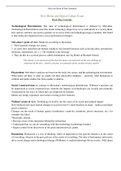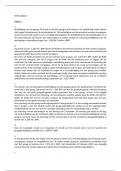Alice de Gresti di San Leonardo
New Media and Digital Culture Exam
Basic Key Concepts
Technological Determinism: The idea of technological determinism is defined by McLuhan,
Technological Determinism state that media technology shapes how we as individuals in a society think,
feel, and act, and how our society operates as we move from one technological age to another. The belief
is that media development forces social and historical changes.
McLuhan’s point of view: Media do according to McLuhan:
1. Their material extends our senses
2. As such, they transform our human condition (our mental functions such as having ideas, perceptions,
emotions, experiences, etc.) → The medium is the message
3. They do this in a cyclical process called remediation (see Jay Bolter & Richard Grusin)
“The wheel… is an extension of the foot the book is an extension of the eye clothing, an
extension of the skin… electric circuitry, an extension of the central nervous system.”
Physicalism: McLuhan’s analyses are based on the body, the senses, and the technological environment.
What unites all three is what we might call their physicalist emphasis – precisely what humanism in
cultural and media studies has been unable to address.
Social Constructivism: In contrast to McLuhan's technological determinism, Williams’s position can
be understood as social constructivism, whereby the impacts of technologies are socially and culturally
constructed by the ways in which they are employed by humans.
Media can simply reproduce and sustain existing power relations.
William’s point of view: Technology in itself is not the cause of its social and cultural impact.
New media do not cause radical changes to occur (in fact it’s more business as usual – media consolidate
power relations)
Changes are the result of human agency (institutions, creativity, intentions, power structures, etc.) for
example free labor.
The people, should…
• Become aware of the intentions behind the technology
• Understand that we can do something with that technology (technology≠media)
• Regain control from the powers of the great industrials/tech. giants.
Humanism: Humanism is a way of thinking, where in opposition to the past the human is in the center
of everything, whereas in the past god was at the center of everything. The idea is that humans and society
drive social change and technological change (Williams) vs media/technology driven society. (McLuhan)
, Alice de Gresti di San Leonardo
Remediation: McLuhan and Williams shared this idea that all new media remediate and refashion
previously existing media.
Remediation is set to reform reality itself, and not simply the appearance of reality. An example is
according to Zuckerberg, the metaverse is set to reform the internet work, entertainment, and
relationships…
Teleological Accounts of Media: A type of argument that explains events/developments in the past as a
preparation for the present and subsequently the future. The argument seeks both an origin and an end.
Choosing a medium technology and going back in time to find evidence and historical markers to
understand where it came from. (Like a line)
Genealogical Theory of History: A teleological account of new media sees new media as the
culmination or the final stage of development that was already present in earlier media forms. A type of
argument that looks at connections between media and the world/period in which they developed or other
media. This approach does not seek an origin or an end. (Like a genealogical tree)
Technological Imaginary: The social and psychological desires (for a better society - wholeness,
completeness) accompanying/projected onto the establishment of a new media phenomenon.
This theory, as MacKenzie and Wajcman (1985 (1999) argue, depicts technology’s ability to determine
the progress of society’s social structures and cultural values. In other words, it argues that technology
drives history. On the other hand, Jacques Ellul and Thomas Hughes assert that technology does not
directly drive history, but rather it becomes a decisive factor at a certain stage in history.
Marshall McLuhan: the medium is the message.
Technology is what matters, not the content or the intent. A technology by its very nature steers us to use
it in a certain way and they engage with/view the world in a certain way.
Media are determinants (mediators) of the environment of our human condition: they determine the
development of a society's social structure and cultural values.
Digital: New media or digital media separate themselves from traditional analog media by being
converged into digital data. They are generated as a series of numbers (the binary computer system). This
digital data is subject to addition, subtraction, multiplication, and division through algorithms within the
software.
Interactivity: The technical ability of a user to intervene in computing processes and see the effects of
the intervention in real-time. It, therefore, transforms consumers from passive to active.
There are different types of interactivity:
- Hypertextual navigation
- Immersive navigation (spatial, like most games)
- Registrational interactivity (adding to platforms such as Wikipedia, forum, or commenting)
- Interactive communication: The term can also be used to describe human communication based on
dialogue and exchange (communications theory).





